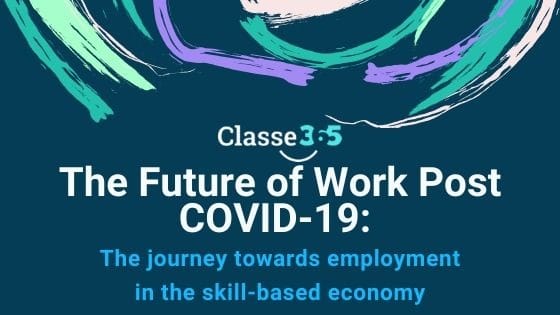By Nandan Keerthi
Knowledge-based economy vs. Skill-based economy.
This isn’t a new discussion. We know that we are moving towards a skill-based economy. Enough has been written and spoken about this in recent years. But considering everything that has transpired since the coronavirus outbreak, it is high time to stop the talk and start to take actions to thrive in the skill-based economy.
Covid-19 impact would cost the equivalent of 195m job losses globally
The above-mentioned projection was made by the United Nation’s labor body in April. This indeed is a grim statistic. And this is one of the reasons for me to write this blog. I would like to offer my opinion on how we could navigate through these unprecedented times.
This isn’t going to be a blog in which I am going to give you ‘5 tips’ or ‘7 tips’ or some ‘magical’ strategy to find a job or secure your current job. What I am rather going to talk about is how we can all approach the current situation and the economy in the best possible way.
For starters, I would like to just explain what knowledge-based and skill-based economy are: knowledge economy is something where knowledge is the key asset, whereas, in a skill-based economy, a niche skill-set for a particular job is considered to give individuals the bigger edge.
So, how should we brace for the post-COVID-19 world?
Educational institutions should understand that degrees alone are no longer enough for students.
It’s a known fact that several big organizations have their own set of curriculums for their employees to learn and upskill. This fact proves that students aren’t necessarily job-ready just by graduating. Hence the educational institutions should prepare their curriculum which has a lot of emphasis on skill-based learning. This way, the students would become more employable. At the same time, organizations would also not need to focus more on training their recruits from scratch. Instead, they could help their employees just to upskill and reskill.
To bring an analogy, the educational institution’s core focus is to deliver solid Lego blocks (students) for companies to mold, shape, and reshape.
Inherent skills should not be taken for granted.
Time management, hard work, creativity, ethics, and passion for learning are some of the skills which are considered to be only inherent and cannot be acquired. This is a WRONG perception. Even these skills can be taught to students. And they can acquire the skills over time over time. The beauty with inherent skills is, though they might not look the most attractive on a resume, they provide the ultimate insight into how the individual would be as an employee. And as much as the companies these days are moving towards looking for skill-rich employees, they consider certain inherent skills to be as important as the acquired skill sets.
Institutions should provide students flexibility in terms of education.
Offering skill-based education is quite tricky. I would even say that it’s tougher than providing knowledge-based learning for students. One method to offer skill-based learning for students in the right way is to make it a more personalized experience for students. This can be done only by providing the students with particular programs that they would want. But this would not be practically possible if every student would want. Instead, they should create a set of standard courses for students that could be easily customized or from which students can pick and choose certain lessons/ parts of it.
NOW is the perfect time for working professionals to upskill and reskill.
There has been a staggering number of job losses. I’m sure most of us would know someone who would have lost his/ her job during the pandemic and some of you could have lost it as well. But keep this in mind. As much as this period is emotionally draining, this is the perfect time to upskill and reskill. When we finally return to normalcy, new markets would be emerging. And obviously, it would open wide new jobs. But some of the existing markets could sadly see a demise.
Irrespective of the scenarios, if everyone could do at least one or two niche courses in a field they want to be in, it would help them stay ahead of the competition whenever an opportunity arises. This corresponds to not just the learning of new skills, but it includes upskilling and reskilling as well. Finding the right courses wouldn’t be as difficult considering the variety of online programs and certification courses that are being offered now.
What we are doing at Classe365 to thrive in the skill-based economy
To start with, we have made sure that all our recruitment are majorly based on what skill set an individual could bring to our company and we don’t look into the degree the person has completed. But that’s not the end of it. When a recruit joins our company, it is almost similar to joining a new course. We try to understand the person’s core skills and then help him/ her with upskilling by enabling them to complete certain courses. Not just for the recruits, we emphasize all our employees to continuously upskill. Apart from this, we are also looking at coming up with our own curriculum which we could even make it mandatory for our employees to complete.
I have taken this as a personal responsibility to ensure all my employees have a personalized upskill curriculum. We are trying to assess the necessary changes we need to make to adapt to the new norm and ensure we are at the forefront to face any challenges.
